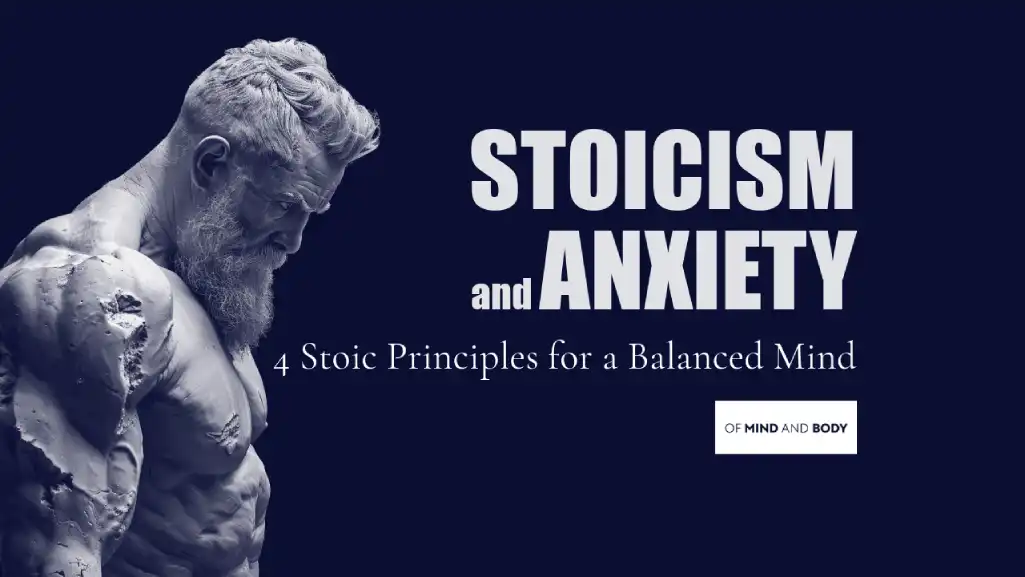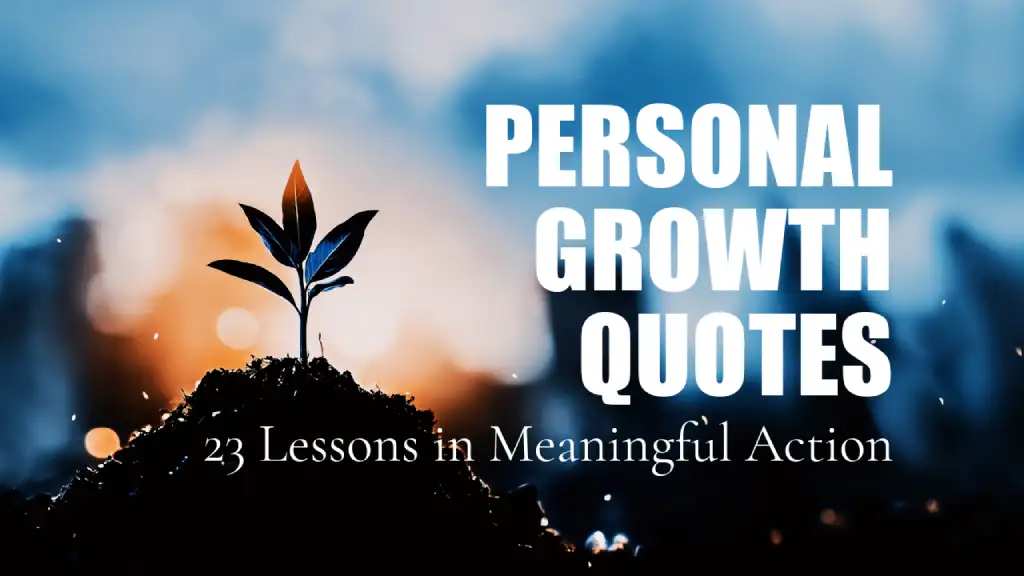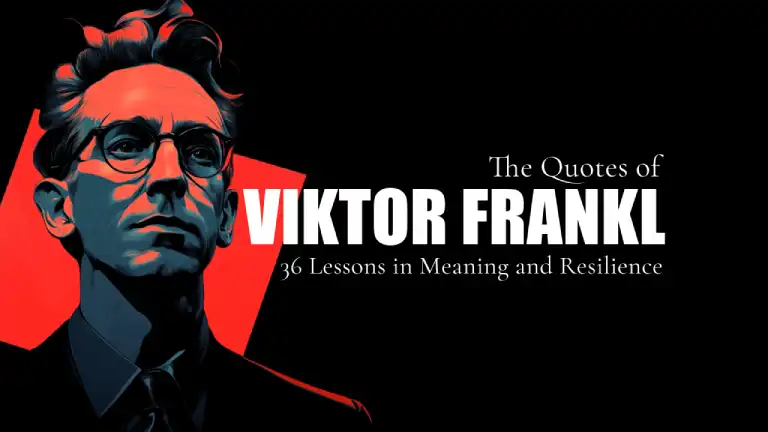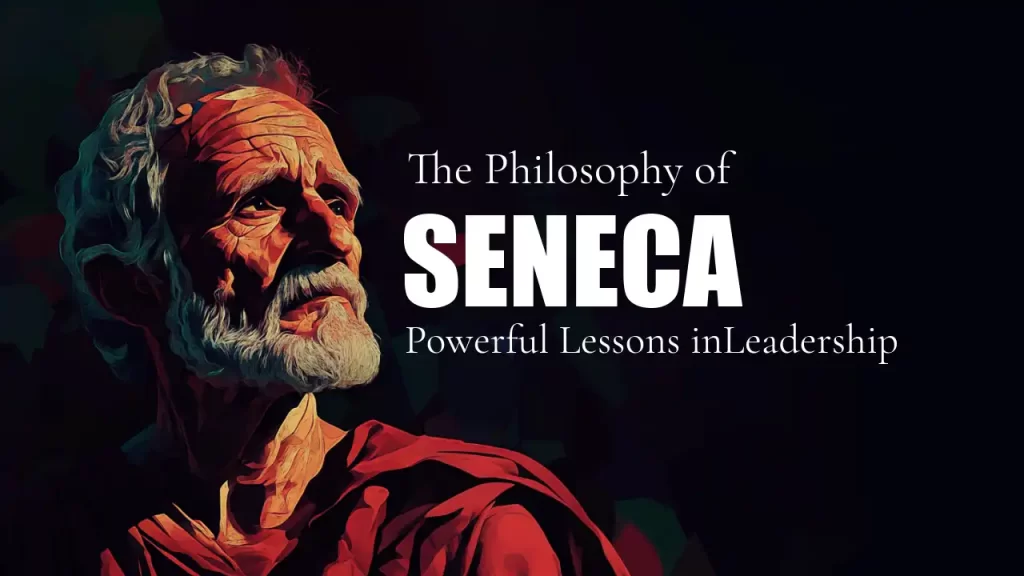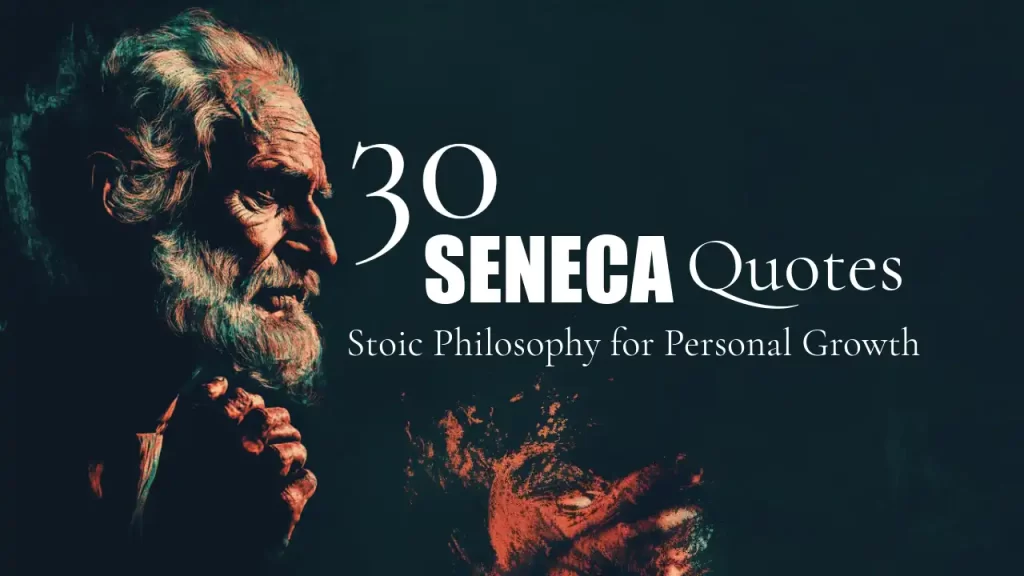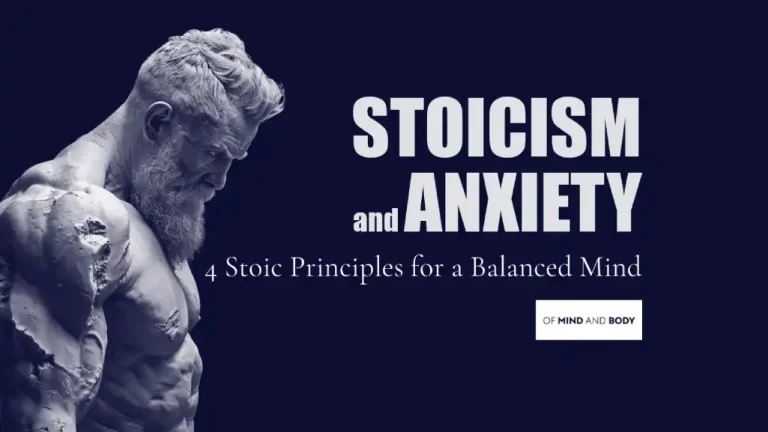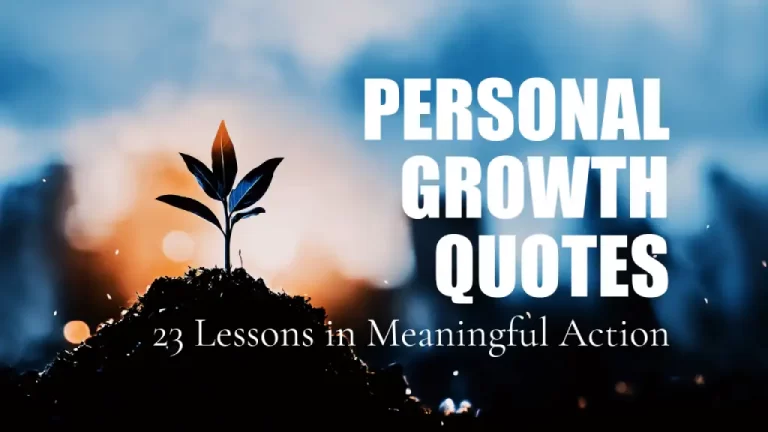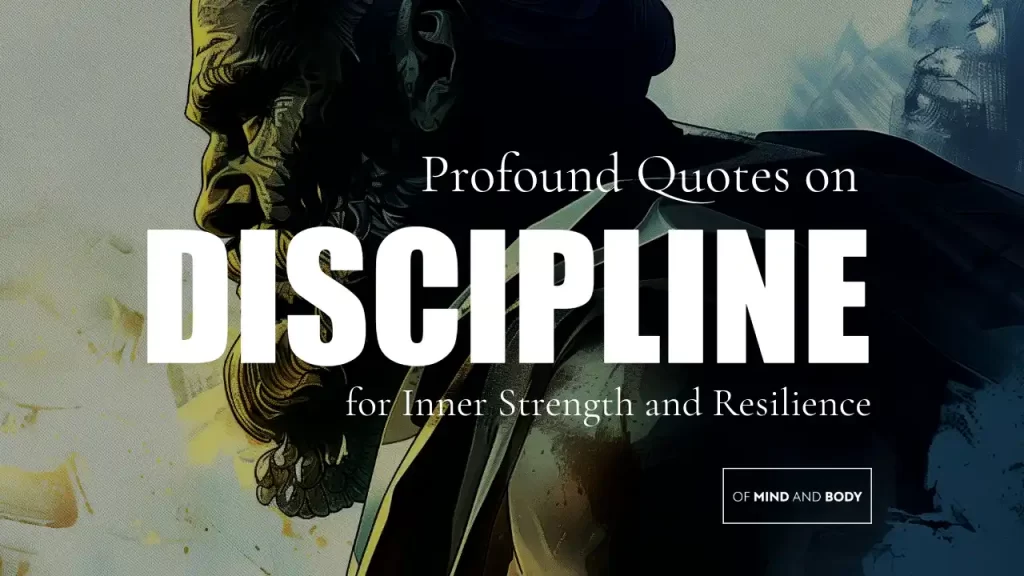
In the following article, we will explore some of the most profound quotes on discipline from prominent thinkers, including the Stoic philosophers, and delve into the wisdom behind their words. Through these Stoic quotes, we aim to highlight the crucial role of discipline in achieving mental well-being and living a life of purpose and resilience.
In the journey towards mastering our mental well-being, discipline emerges as an indispensable ally. At its core, discipline is about the consistent effort to align our actions, thoughts, and behaviours with our values and long-term goals. It’s the foundation that supports personal growth, resilience, and the ability to navigate life’s challenges with grace and composure.
The following Stoic quotes on discipline inspire us to take control of our minds, focus on our responses to external events, and embody our principles through action. By integrating these teachings into our daily practices, we can build a solid foundation for mental well-being, leading to a more fulfilling and balanced life.
Quotes on Discipline from Stoic Philosophers
“You have power over your mind – not outside events. Realise this, and you will find strength.”
Marcus Aurelius
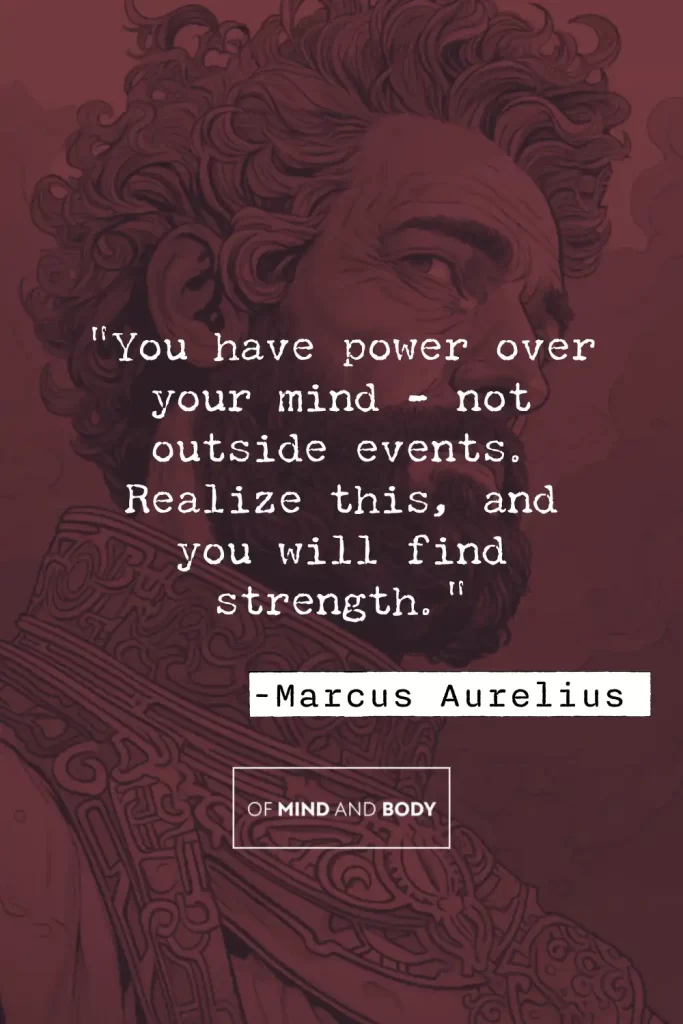
The Wisdom behind the words
These quotes emphasise the Stoic principle that true power lies within our control over our own thoughts and reactions. External events are often beyond our control, and attempting to control them can lead to frustration and helplessness. By focusing on our internal state—our thoughts, emotions, and reactions—we can cultivate resilience and inner strength.
This perspective is liberating because it shifts the focus from attempting to manage the uncontrollable to mastering what is within our power. In essence, discipline is about consistently choosing how we respond to life’s challenges, maintaining our composure and purpose regardless of external circumstances.
“Waste no more time arguing about what a good man should be. Be one.”
Marcus Aurelius
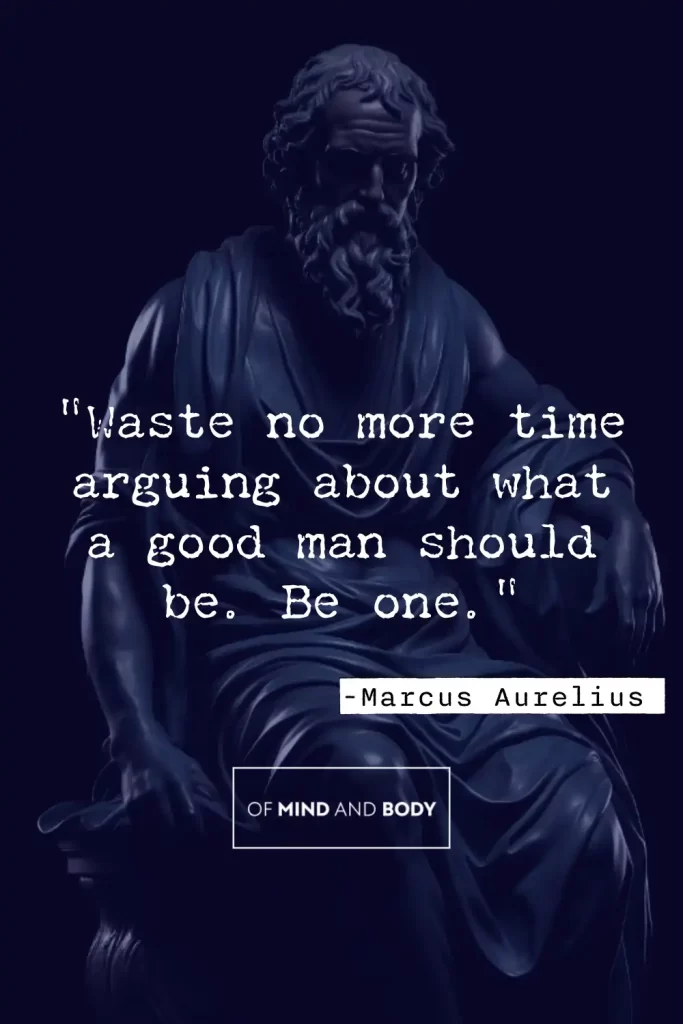
The Wisdom behind the words
This quote stresses the importance of action over discussion. Philosophical debates about morality and virtue are valuable, but they must translate into real-life behaviour to be meaningful. Discipline is the bridge between knowing what is right and actually doing it.
Marcus Aurelius encourages us to embody our ideals rather than just talk about them. This requires a commitment to self-improvement and a consistent effort to align our actions with our values. It’s a call to direct our energy towards living out our principles daily, demonstrating discipline through tangible actions rather than abstract contemplation.
“First say to yourself what you would be; and then do what you have to do.”
Epictetus
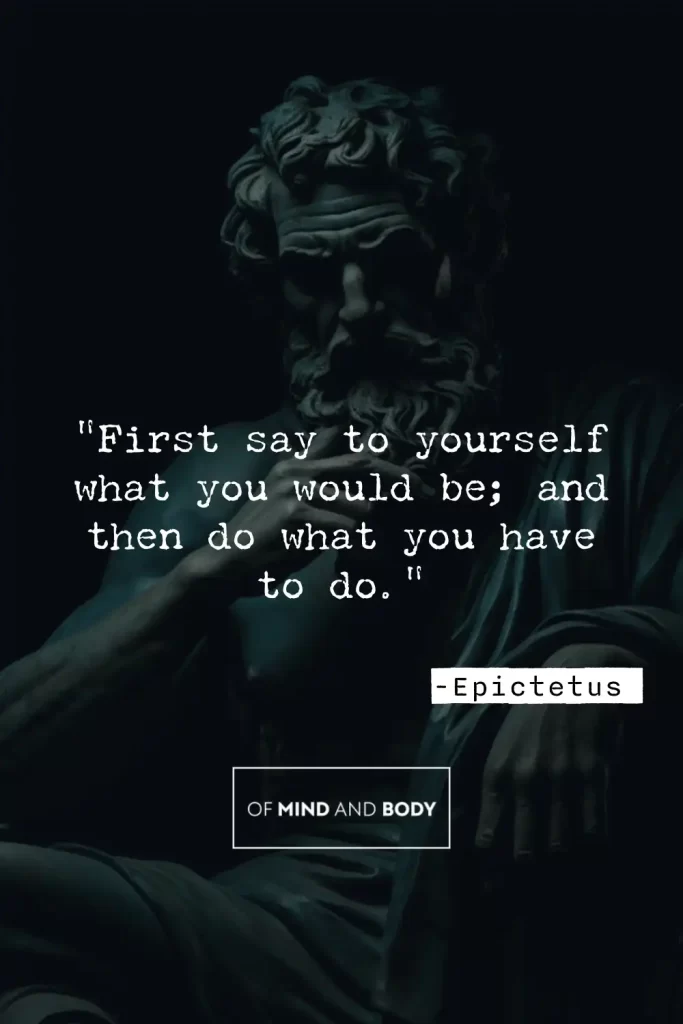
The Wisdom behind the words
This quotes Stoic message underscores the importance of discipline, self-awareness and intentionality in the pursuit of personal development. Discipline begins with a clear vision of who we want to become. Once we establish this vision, we must take the necessary steps to realise it, regardless of the challenges or discomforts involved.
This process involves setting specific goals and committing to a plan of action. Epictetus emphasises that self–discipline is about making deliberate choices and following through with persistent effort. It’s a reminder that transformation requires not only dreaming and planning but also the disciplined execution of those plans.
“It’s not what happens to you, but how you react to it that matters.”
Epictetus
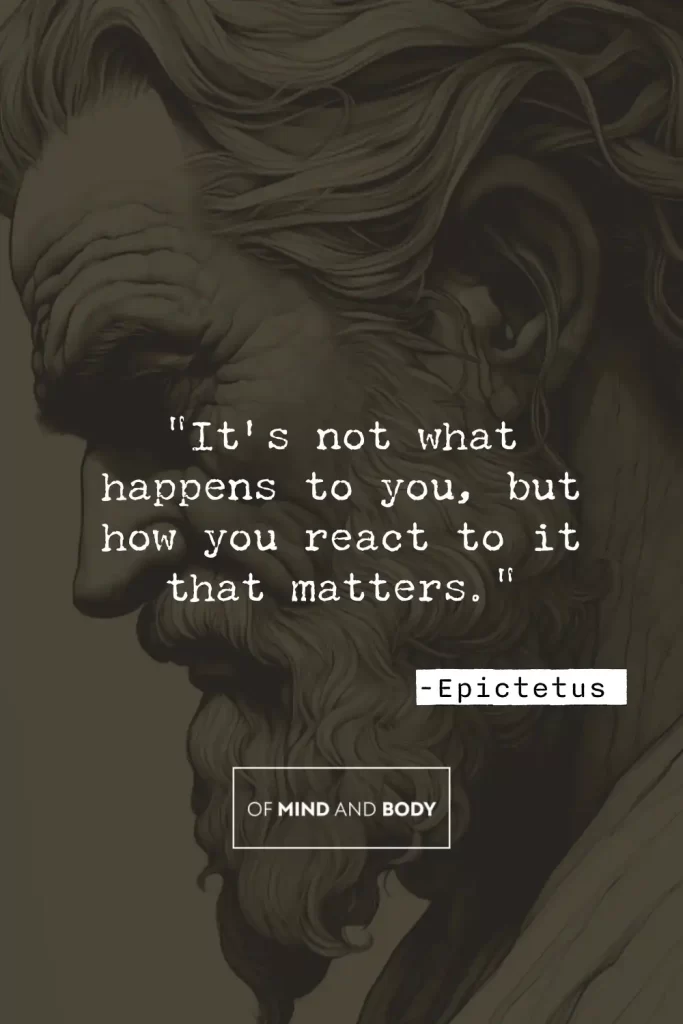
The Wisdom behind the words
Epictetus highlights the power of personal responsibility and emotional discipline. Life is full of unpredictable events, many of which are beyond our control. However, we always have control over our responses.
This perspective empowers us to choose our attitudes and reactions, transforming potential setbacks into opportunities for growth. Discipline, in this context, involves maintaining composure, resilience, and a positive mindset regardless of external circumstances. It’s about training our minds to focus on constructive responses rather than dwelling on the negative aspects of our experiences.
“Don’t explain your philosophy. Embody it.”
Epictetus
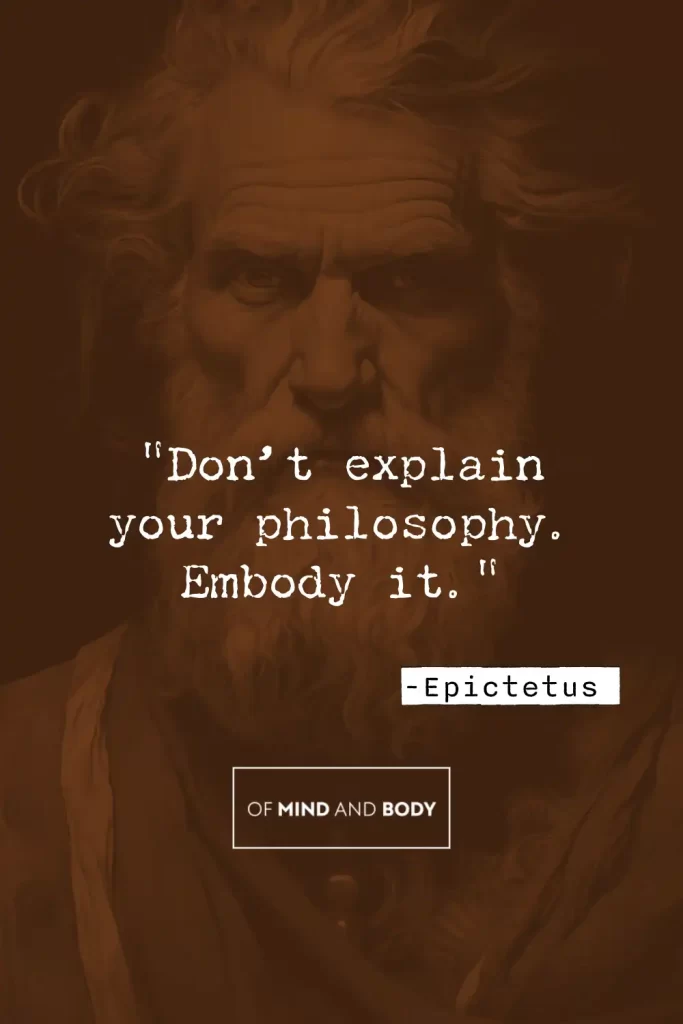
The Wisdom behind the words
This quote encourages living out one’s beliefs through actions rather than words. True discipline is demonstrated not by what we say but by what we do. Epictetus suggests that embodying our philosophy requires consistent effort and integrity. It’s about aligning our behaviour with our values in every aspect of our lives.
This form of discipline involves a deep commitment to authenticity and the courage to act according to our principles, even when it’s difficult. By embodying our beliefs, we set an example for others and create a powerful impact through our actions.
“The first and best victory is to conquer self.”
Plato
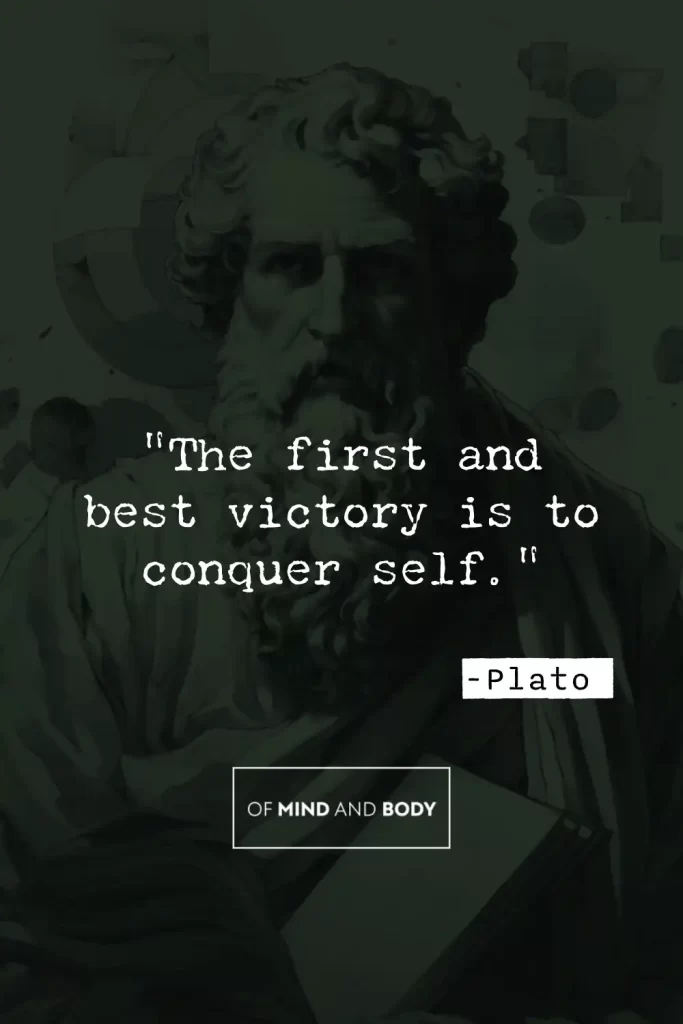
The Wisdom behind the words
Plato’s quote highlights the significance of self-mastery. The greatest challenge and triumph lie in gaining control over our own impulses, emotions, and desires. This form of discipline is foundational to all other successes because it enables us to act with intention and purpose.
Self-conquest involves recognise and overcoming our weaknesses, developing self-awareness, and consistently choosing behaviours that align with our higher goals. It’s about creating inner harmony and strength, which in turn empowers us to face external challenges with confidence and resilience.
“Through discipline comes freedom.”
Aristotle
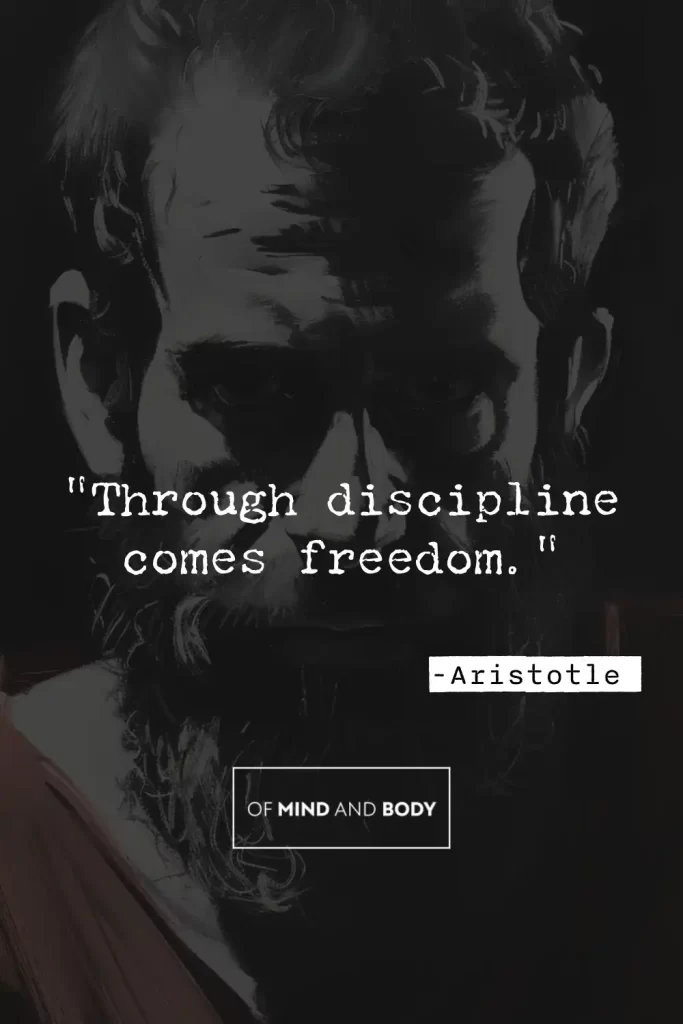
The Wisdom behind the words
Aristotle’s quote illustrates the paradox that disciplined behaviour leads to greater freedom. By imposing structure and control on our actions, we gain the ability to achieve our goals and live a fulfilling life.
Discipline liberates us from the chaos of unbridled impulses and distractions. It creates the conditions for true freedom, which is the ability to pursue meaningful goals and live in accordance with our values. Without discipline, we are enslaved by our whims and external influences, unable to achieve lasting satisfaction or success.
More Quotes on Discipline
“Discipline is the bridge between goals and accomplishment.”
Jim Rohn
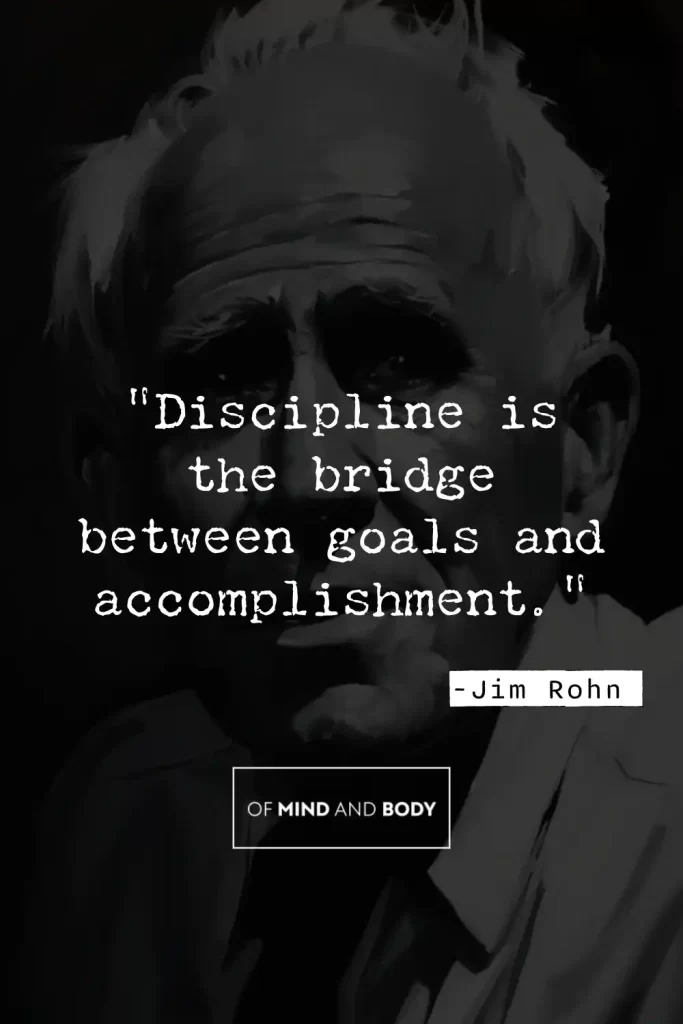
The Wisdom behind the words
Jim Rohn’s quotes emphasise that discipline is the essential link between setting goals and achieving them. It is through disciplined effort and perseverance that dreams are turned into reality. Goals without discipline remain unfulfilled aspirations.
Discipline involves creating a plan, sticking to it, and making consistent progress despite obstacles. It’s about committing to the necessary steps, maintaining focus, and refusing to give up. This persistent effort transforms abstract goals into tangible accomplishments, demonstrating the transformative power of disciplined action.
“I fear not the man who has practiced 10,000 kicks once, but I fear the man who has practiced one kick 10,000 times.”
Bruce Lee
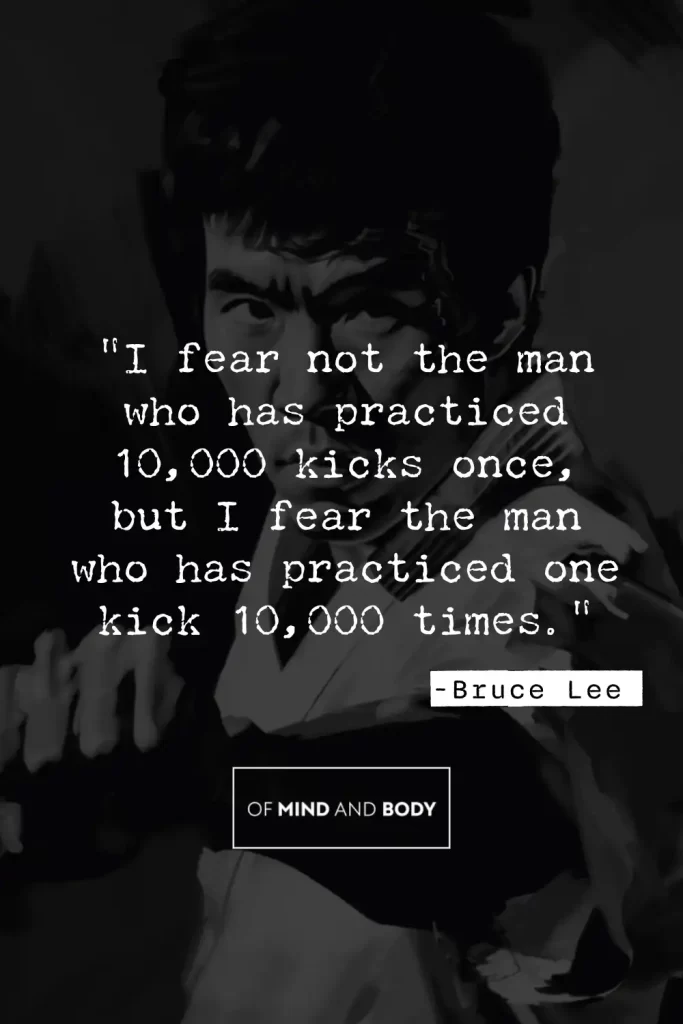
The Wisdom behind the words
Bruce Lee’s quote highlights the power of focus, discipline and practice. Mastery comes from consistent, repeated effort on a single task. This disciplined approach leads to expertise and confidence, illustrating the depth of skill achievable through persistent practice.
It’s a reminder that quality and repetition are more important than quantity. By honing a specific skill with discipline and dedication, you achieve a level of proficiency and effectiveness that surpasses superficial familiarity with many skills. This focused discipline fosters excellence and mastery.
“With self-discipline most anything is possible.”
Theodore Roosevelt
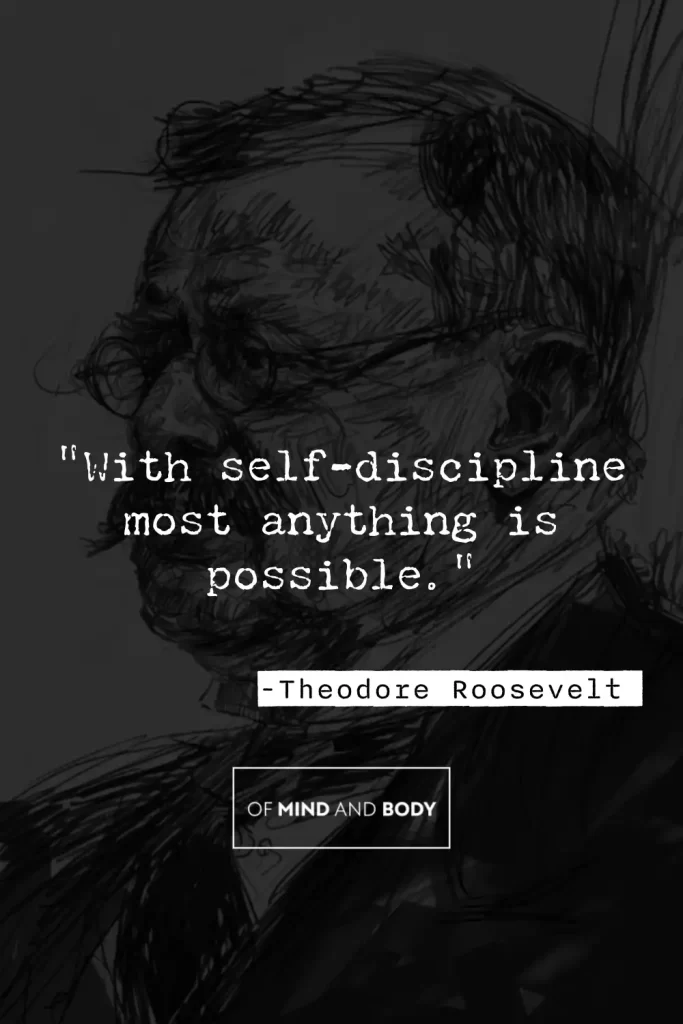
The Wisdom behind the words
Roosevelt’s quote underscores the limitless potential unlocked by self–discipline. When you control your actions and commit to your goals with disciplined effort, you can achieve extraordinary things. Discipline transforms potential into achievement by enabling consistent, focused action towards your objectives.
It involves setting priorities, managing time effectively, and persevering through challenges. This relentless commitment to disciplined effort opens up a world of possibilities, making seemingly impossible goals attainable.
“He who conquers himself is the mightiest warrior.”
Confucius
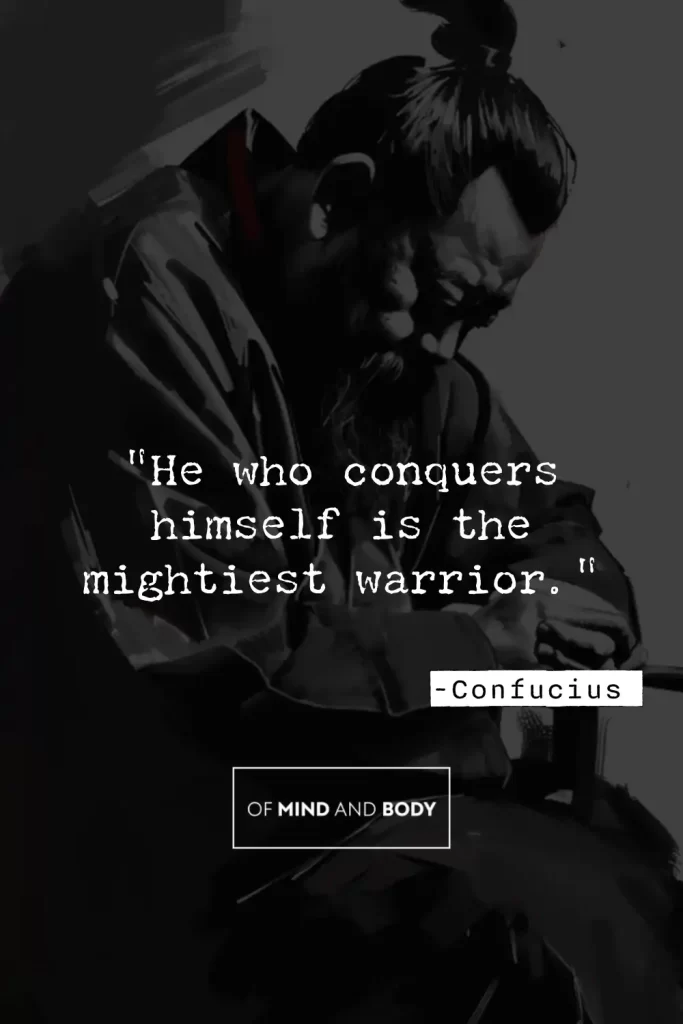
The Wisdom behind the words
Confucius equates self-mastery with true strength. The greatest battle is within, and victory over oneself—overcoming personal weaknesses and impulses—is the pinnacle of disciplined living. Such mastery is a profound demonstration of inner strength and resilience.
It involves developing self-awareness, self-control, and the ability to consistently choose actions that align with your higher goals. By conquering oneself, you gain the power to navigate external challenges with confidence and composure, embodying the true essence of a disciplined warrior.
“Effort only fully releases its reward after a person refuses to quit.”
Napoleon Hill
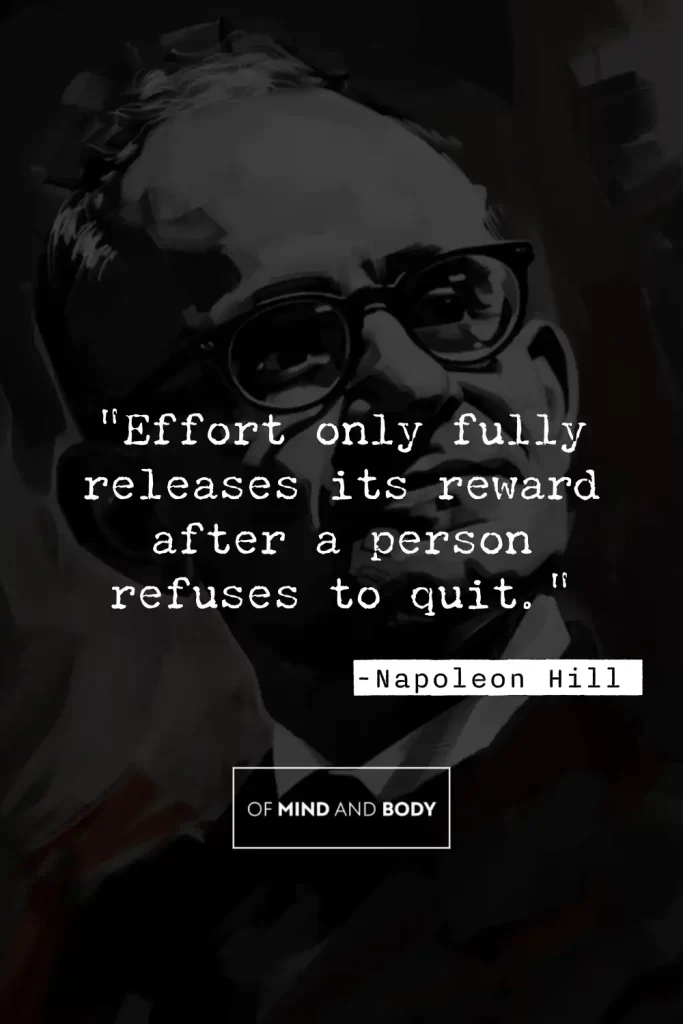
The Wisdom behind the words
Napoleon Hill highlights perseverance as a key component of discipline. The true benefits of effort are realised through sustained commitment and the refusal to give up. Discipline requires enduring effort and unwavering determination to reach success.
It’s about pushing through difficulties, maintaining motivation, and continuing to work towards your goals even when progress is slow or challenges arise. This relentless persistence ultimately leads to the full realisation of your efforts, demonstrating the power of disciplined perseverance.
“He who cannot obey himself will be commanded. That is the nature of living creatures.”
Friedrich Nietzsche
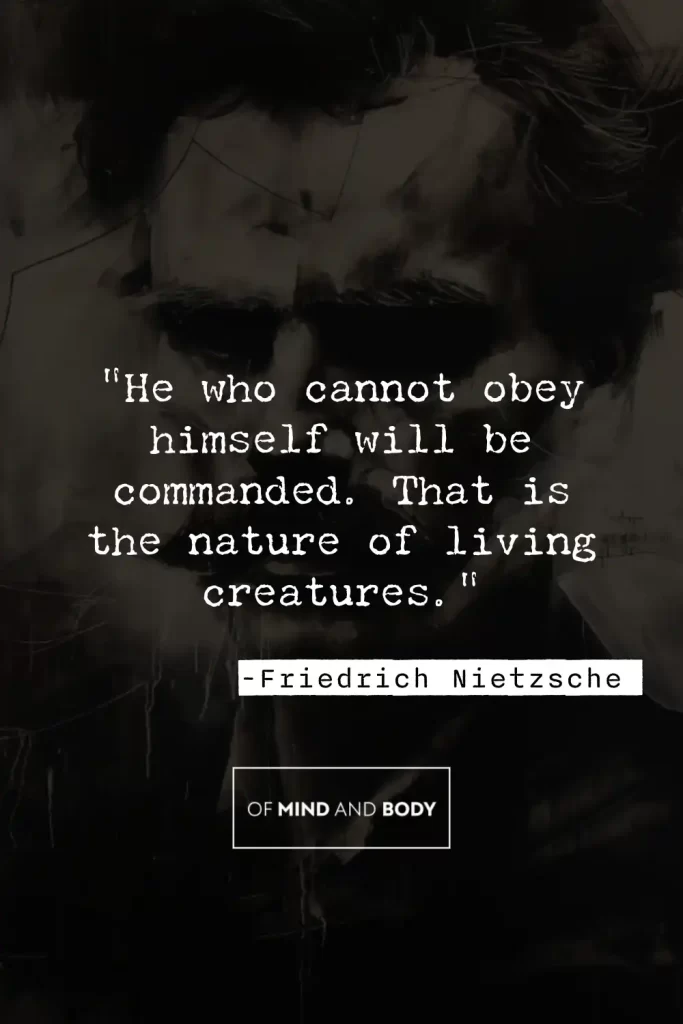
The Wisdom behind the words
Nietzsche points out the necessity of self–discipline for autonomy. Without the ability to control oneself, external forces will dictate your actions. Discipline is essential for personal freedom and self-governance.
It involves developing the ability to set and follow your own rules, making decisions based on your values and goals rather than external pressures. This self-mastery enables you to lead a life of purpose and integrity, free from the control of others or the whims of circumstance.
“Confidence comes from discipline and training.”
Robert Kiyosaki
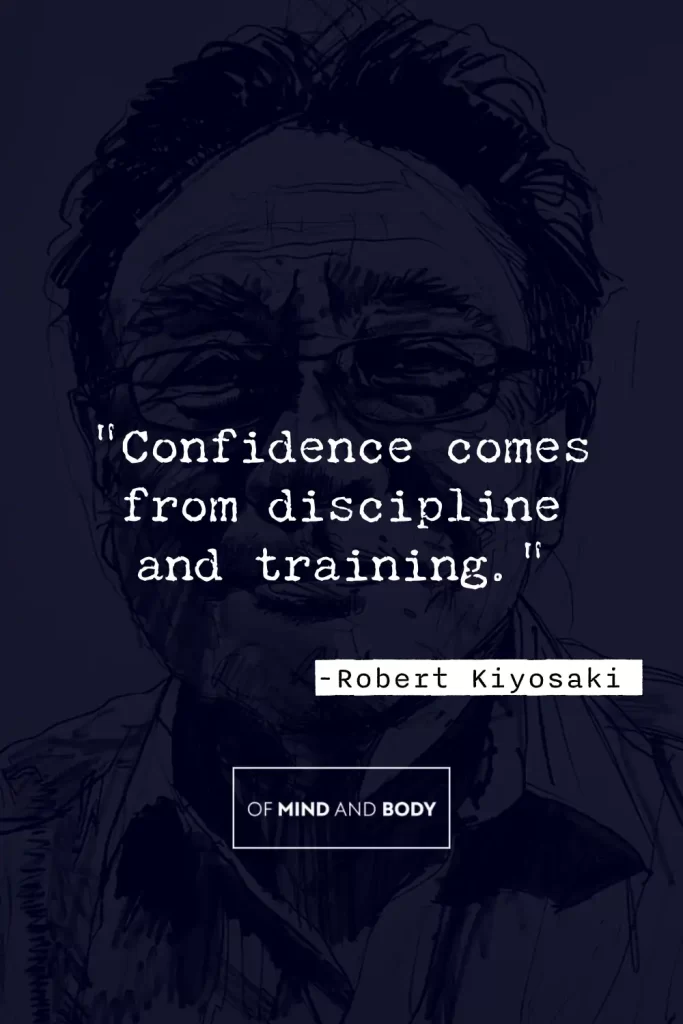
The Wisdom behind the words
Kiyosaki connects discipline with confidence. Through disciplined practice and consistent training, you build competence and self-assurance. Discipline fosters the skills and self-belief necessary for success.
It’s about committing to a regimen of continuous improvement, embracing challenges, and learning from failures. This disciplined approach builds a solid foundation of knowledge and experience, which in turn boosts your confidence and ability to achieve your goals.
“The two most powerful warriors are patience and time.”
Leo Tolstoy
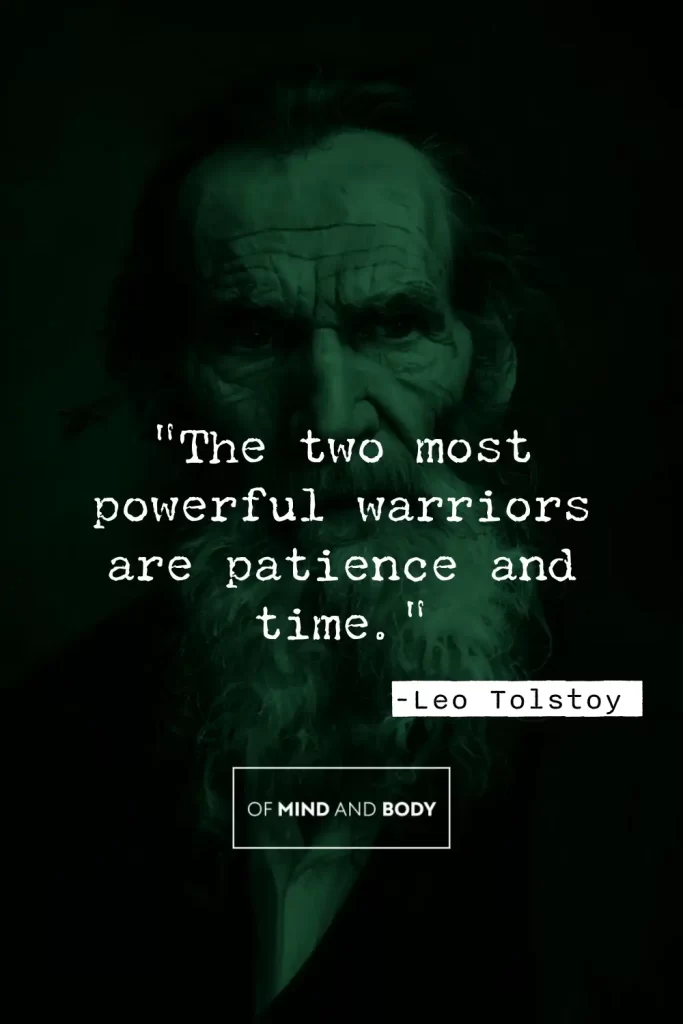
The Wisdom behind the words
Tolstoy underscores the importance of patience and time in the pursuit of disciplined goals. Achieving significant results often requires sustained effort over long periods. Discipline involves patience and the ability to persevere through time.
It’s about understanding that meaningful progress is often slow and that enduring commitment is necessary to overcome obstacles and achieve lasting success. This long-term perspective helps you stay focused and motivated, recognising that disciplined effort over time leads to profound and lasting achievements.
“The undisciplined are slaves to moods, appetites and passions.”
Stephen Covey
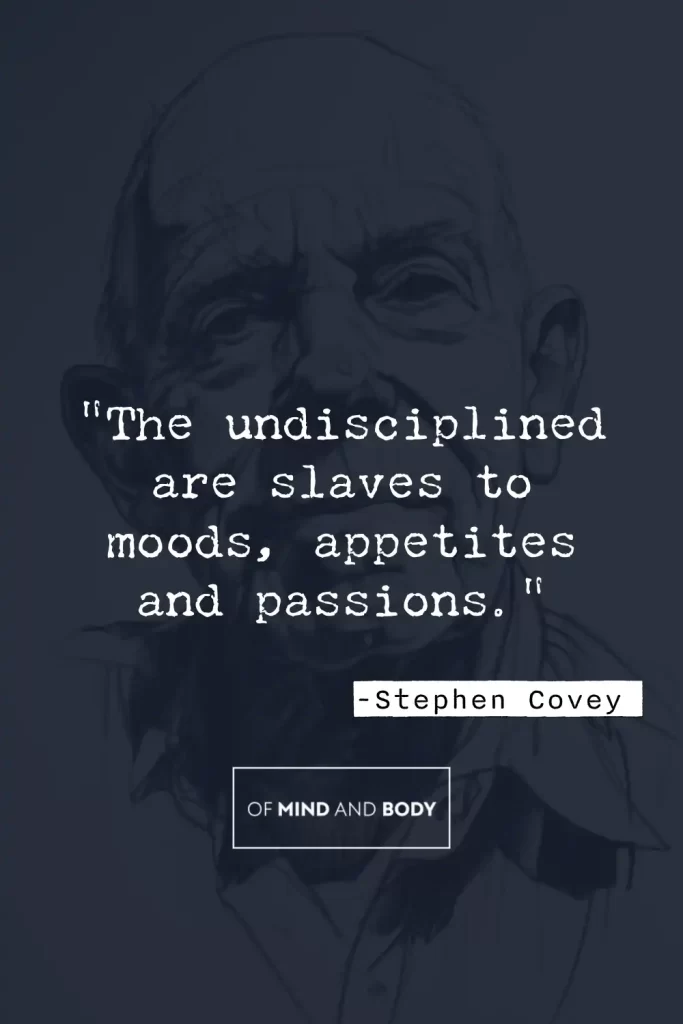
Wisdom behind the words
Covey highlights the freedom that comes with discipline. Without self-control, individuals are at the mercy of their changing emotions and desires. Discipline liberates you from these constraints, allowing for purposeful and consistent action.
It involves developing the ability to manage your impulses, make rational decisions, and stay committed to your goals regardless of fluctuating moods or external temptations. This disciplined approach leads to greater stability, effectiveness, and fulfilment in life.
“Do nothing which is of no use.”
Miyamoto Musashi
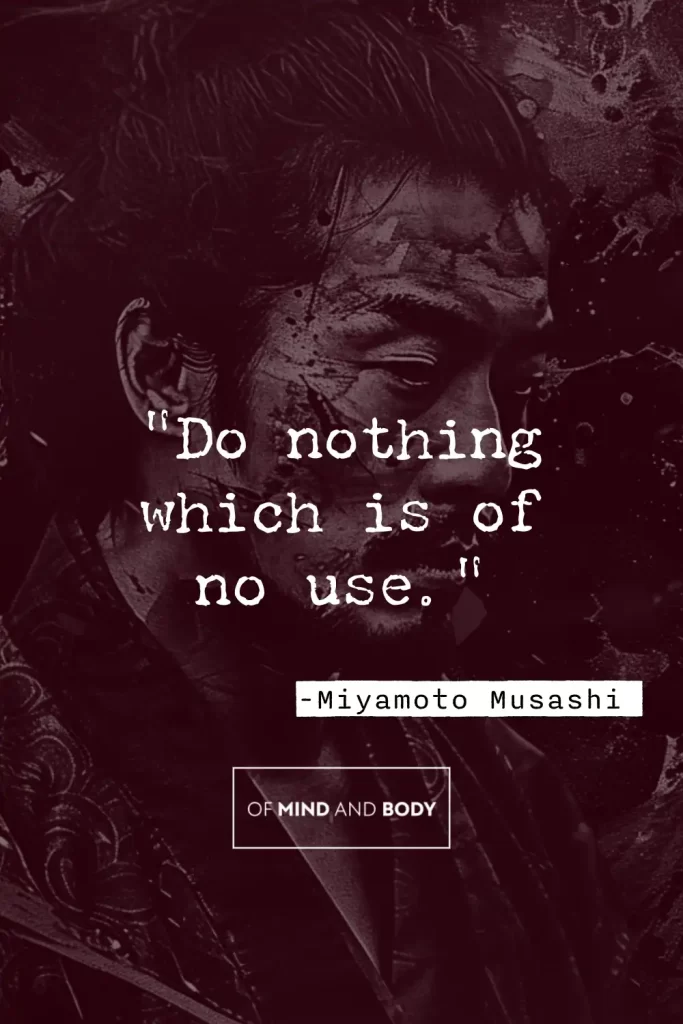
The Wisdom behind the words
Musashi’s quote advocates for purposeful discipline. Every action should contribute to your goals and well-being. By eliminating wasteful activities, you focus your energy on what truly matters, embodying disciplined efficiency.
It’s about prioritising tasks that align with your objectives and avoiding distractions or unproductive behaviours. This disciplined focus ensures that your efforts are always directed towards meaningful pursuits, maximising your productivity and effectiveness.
“A disciplined mind leads to happiness, and an undisciplined mind leads to suffering.”
Dalai Lama
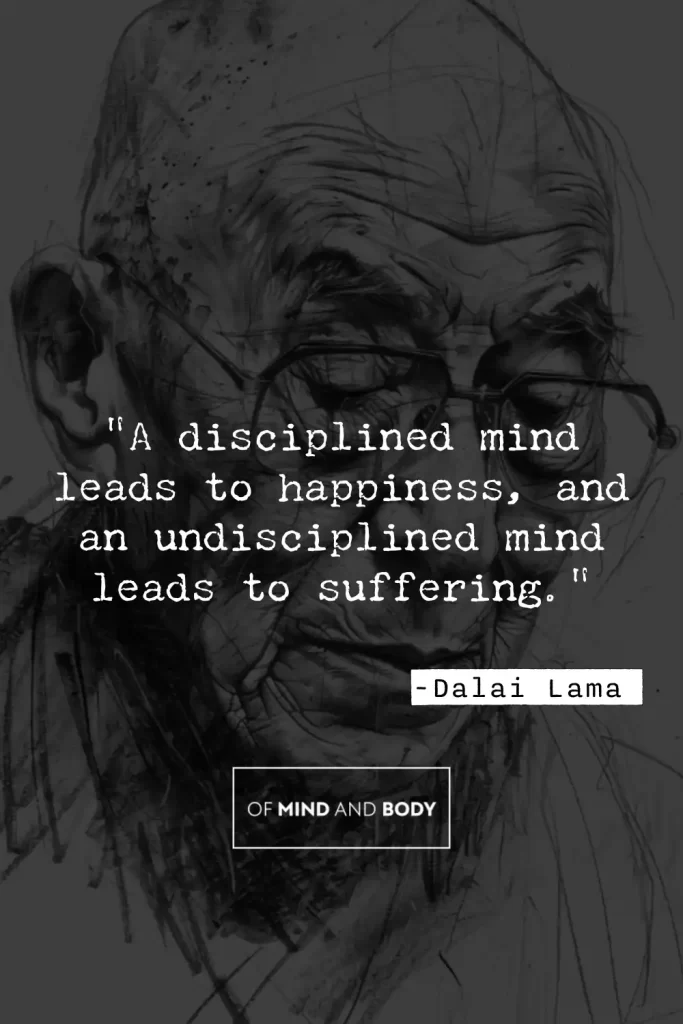
The Wisdom behind the words
The Dalai Lama emphasises the connection between mental discipline and well-being. A disciplined mind can manage stress, make better decisions, and maintain inner peace, leading to greater happiness.
Conversely, lack of discipline results in chaos and suffering. It’s about training your mind to focus on positive thoughts, manage negative emotions, and make choices that enhance your overall well-being. This mental discipline creates a stable and peaceful inner environment, fostering a sense of happiness and fulfilment.
“Perhaps the most valuable result of all education is the ability to make yourself do the thing you have to do, when it ought to be done, whether you like it or not.”
Thomas Huxley
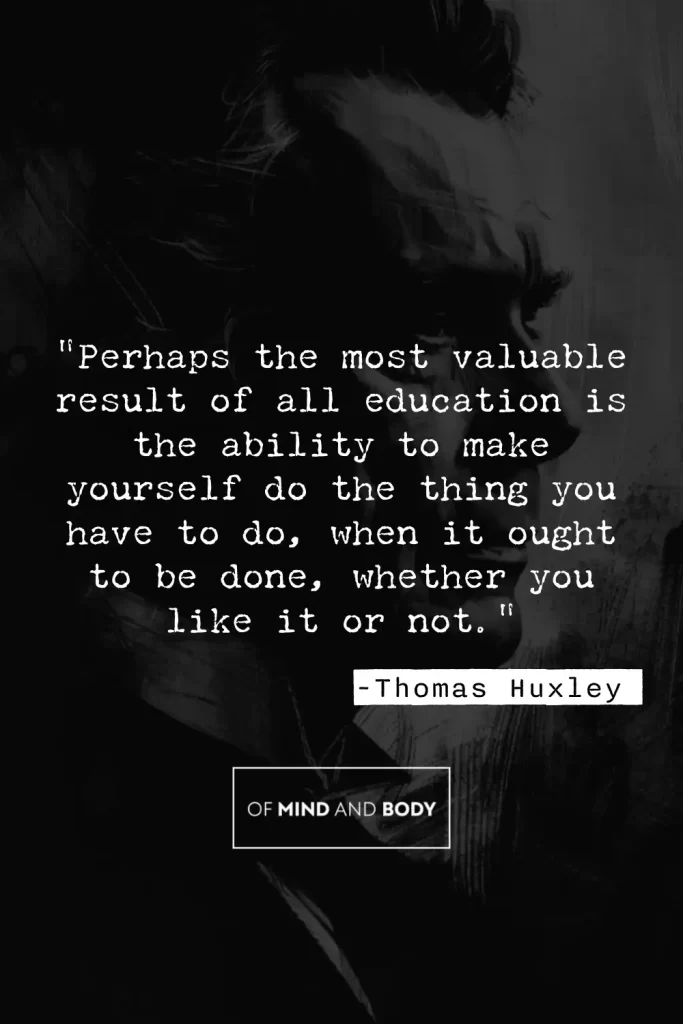
The Wisdom behind the words
Huxley highlights self–discipline as the ultimate outcome of education. The ability to act according to necessity, regardless of personal preference, is a critical skill for achieving success and fulfilling responsibilities.
It involves developing the capacity to prioritise tasks, manage time effectively, and stay focused on your goals even when motivation wanes. This disciplined approach ensures that you can consistently perform necessary actions, leading to greater productivity and success in all areas of life.
“Mastering others is strength. Mastering yourself is true power.”
Lao Tzu
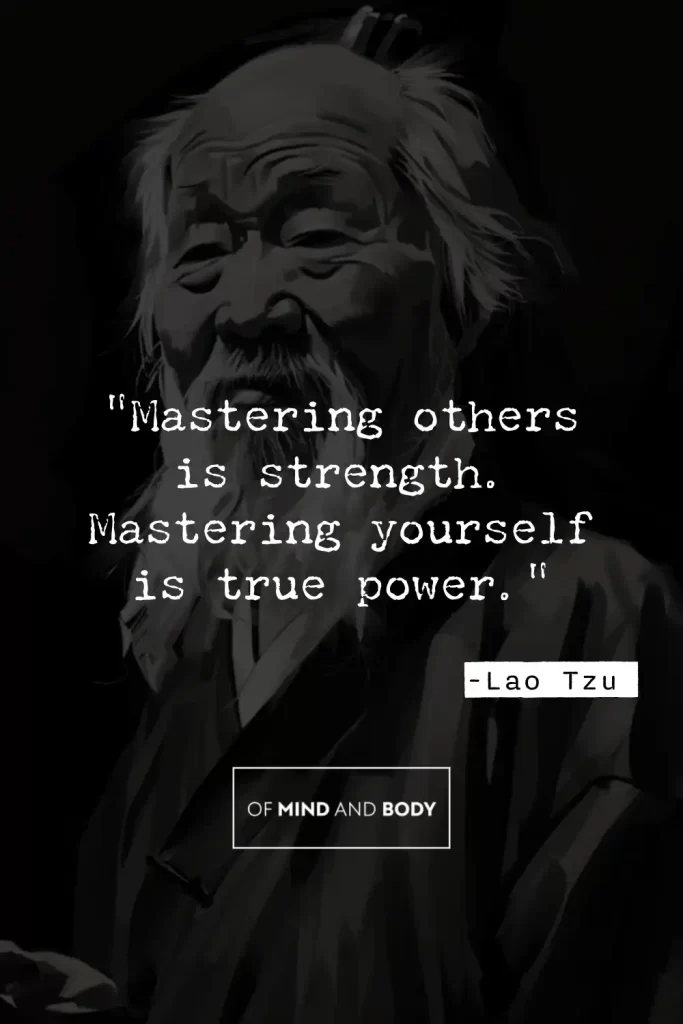
The Wisdom behind the words
Lao Tzu distinguishes between external and internal power. While controlling others shows strength, true power lies in self-mastery. Discipline is about controlling your own thoughts, actions, and emotions, leading to profound personal empowerment.
It involves developing self-awareness, self-control, and the ability to consistently align your behaviour with your values and goals. This inner mastery provides a solid foundation for navigating life’s challenges with confidence and resilience, embodying the true essence of personal power.
Final Thoughts
The quotes of the Stoic philosophers who emphasised the importance of virtue and rationality, provide profound insights into the power of discipline. Stoicism teaches that while we cannot control external events, we can control our responses to them. This principle places a significant emphasis on self–discipline as a means to achieve tranquillity and inner strength. The Stoics believed that by cultivating discipline, we could maintain our focus on what truly matters, manage our emotions, and lead a life of purpose and integrity.
Discipline in mental well-being involves the daily practice of self-care, mindfulness, and the conscious effort to foster positive thoughts and behaviours. It’s about developing routines that support mental health, such as regular exercise, meditation, and adequate rest. More importantly, it’s about the strength to persevere through setbacks and challenges, maintaining a balanced perspective and a resilient spirit.




